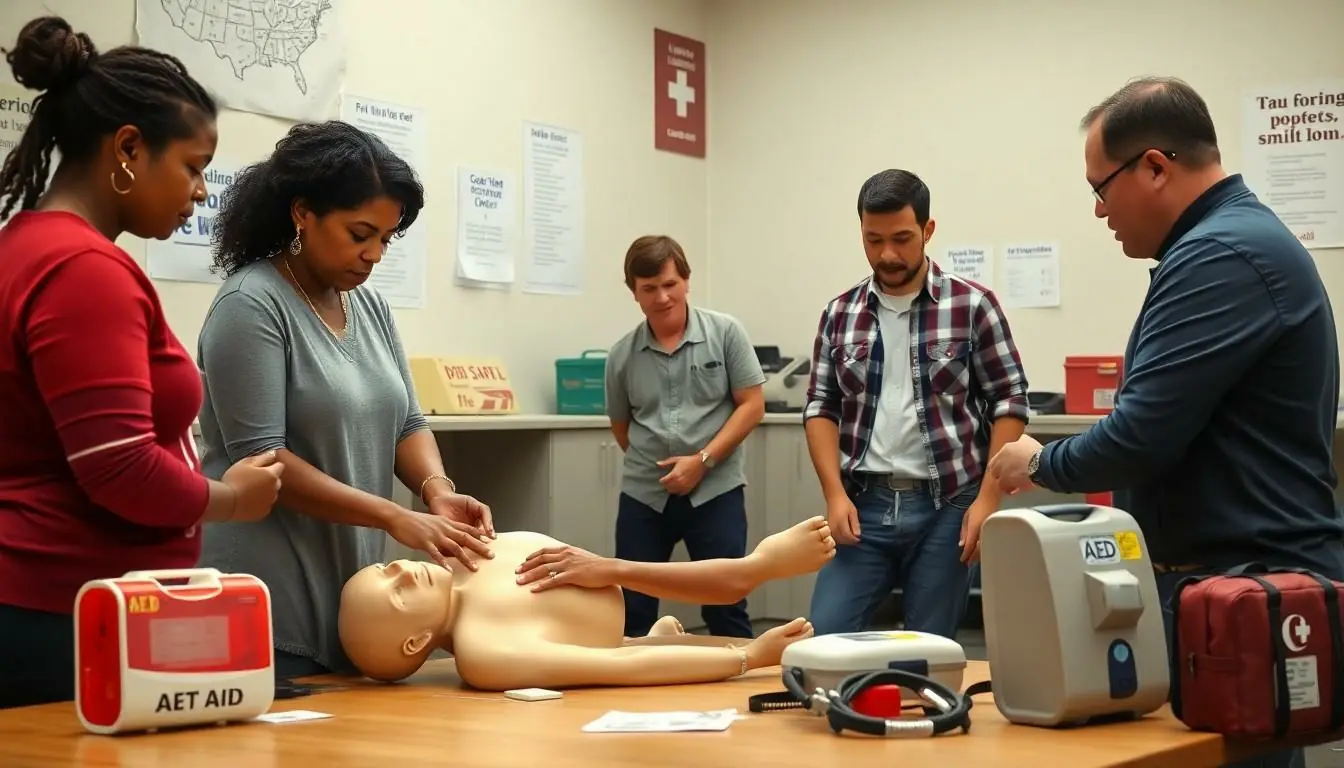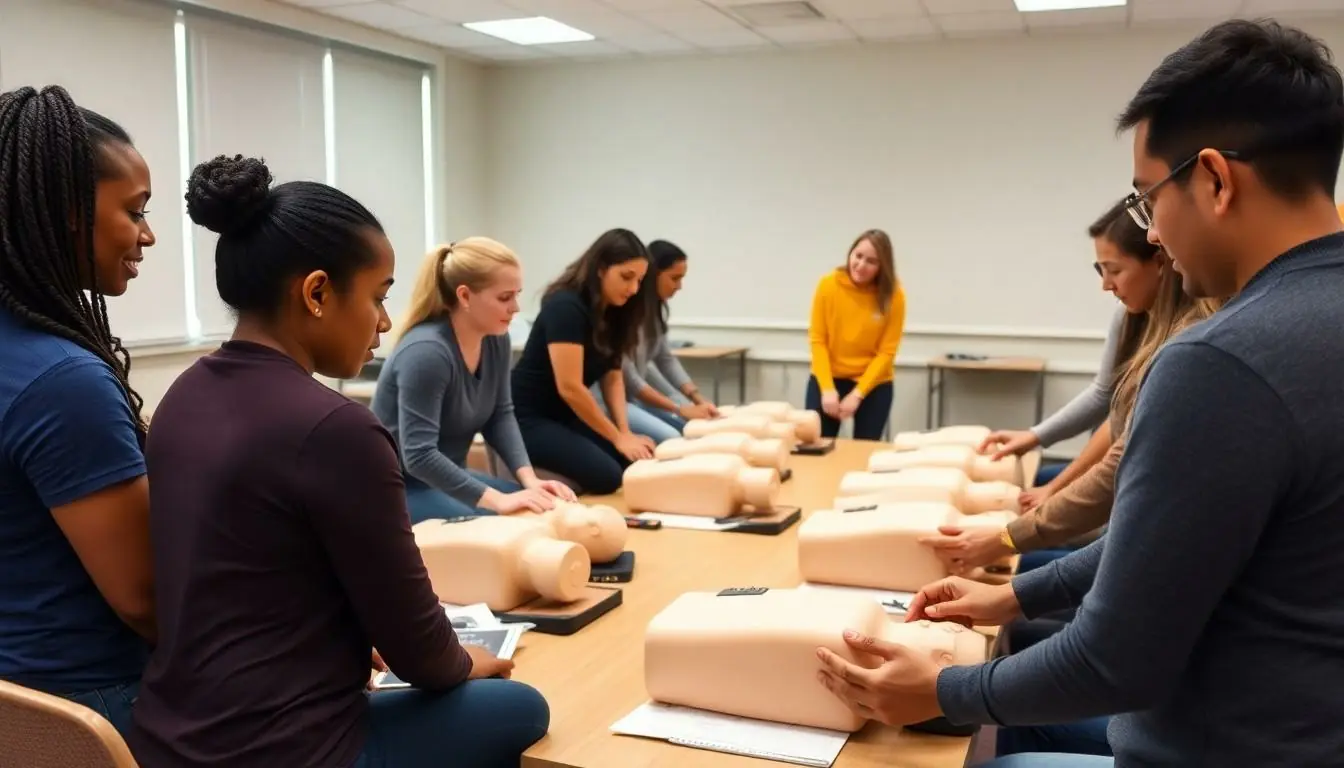The Emergency Care and Safety Institute (ECSI) stands at the forefront of emergency response education delivering life-saving knowledge to millions across the globe. With its comprehensive training programs and cutting-edge curriculum ECSI transforms ordinary individuals into confident first responders ready to tackle any emergency situation.
From CPR certification to advanced life support training ECSI’s dynamic approach combines hands-on practice with real-world scenarios. Their expert instructors don’t just teach protocols – they create competent emergency responders who understand both the “how” and “why” behind critical life-saving techniques. Whether it’s a workplace safety requirement or personal skill development ECSI’s programs meet the highest industry standards while remaining accessible and engaging for all skill levels.
Table of Contents
ToggleWhat Is the Emergency Care and Safety Institute (ECSI)
The Emergency Care and Safety Institute stands as a leading education organization dedicated to emergency response training certifications. ECSI operates as a division of the American Safety & Health Institute, providing standardized emergency care education programs across the United States.
ECSI’s curriculum encompasses:
- Basic Life Support certification programs
- Advanced Cardiac Life Support training
- First Aid emergency response courses
- Automated External Defibrillator instruction
- Bloodborne pathogens safety education
Organizations served by ECSI include:
- Healthcare facilities
- Educational institutions
- Corporate organizations
- Public safety agencies
- Community centers
| Training Statistics | Numbers |
|---|---|
| Annual students trained | 100,000+ |
| Active instructors | 5,000+ |
| Training centers | 1,200+ |
| Available courses | 30+ |
The institute’s training programs align with current emergency cardiovascular care guidelines established by the International Liaison Committee on Resuscitation (ILCOR). Expert medical professionals review ECSI’s course materials regularly to maintain compliance with the latest scientific evidence-based protocols.
ECSI’s educational approach combines:
- Digital learning platforms
- Hands-on skill practice
- Scenario-based training
- Professional instructor guidance
- Interactive assessment tools
Training facilities receive comprehensive support through ECSI’s administrative systems including online course management platforms certification tracking databases instructor resources.
Key Training Programs and Certifications
ECSI provides comprehensive certification programs designed to meet industry standards and regulatory requirements. Their training programs integrate practical skills with evidence-based protocols ensuring participants develop competency in emergency response techniques.
First Aid and CPR Courses
ECSI’s First Aid and CPR courses teach life-saving techniques through hands-on practice sessions. The CPR certification program covers adult, child and infant CPR along with AED operation techniques. Participants learn essential skills including wound care, bleeding control, choking response and fracture management. The courses incorporate scenario-based training with mannequins and simulation equipment for realistic practice. Certification completion requires demonstrating proficiency in chest compressions, rescue breathing and proper AED pad placement. Programs range from basic 4-hour courses to comprehensive 16-hour certifications accepted by employers, schools and healthcare facilities.
Workplace Safety Training
ECSI delivers specialized workplace safety programs tailored to different industry requirements. Training covers bloodborne pathogens safety, fire prevention, ergonomics and hazard communication protocols. Participants receive instruction on proper personal protective equipment usage and workplace emergency response procedures. The curriculum addresses OSHA compliance standards while incorporating industry-specific scenarios. Programs include online modules, classroom sessions and skills assessments. Certification periods vary from 1-2 years based on course type and regulatory requirements.
Emergency Medical Response
ECSI’s emergency medical response training prepares participants for critical care situations. Programs cover patient assessment, trauma care, medical emergencies and EMS operations. The curriculum includes advanced airway management, oxygen administration and spinal immobilization techniques. Training incorporates high-fidelity simulation equipment for practicing advanced life support skills. Certification requires completing practical evaluations and written examinations. Programs align with National EMS Education Standards and maintain accreditation through the Commission on Accreditation for Pre-Hospital Continuing Education.
Industry Standards and Accreditation
The Emergency Care and Safety Institute maintains rigorous compliance with national standards for emergency care education. ECSI’s programs undergo regular evaluation to ensure alignment with current medical protocols and industry requirements.
National Recognition
ECSI holds accreditation from the Commission on Accreditation for Pre-Hospital Continuing Education (CAPCE) and the Occupational Safety and Health Administration (OSHA). Their certification programs meet or exceed standards set by the American Heart Association (AHA) and the International Liaison Committee on Resuscitation (ILCOR). The training materials incorporate guidelines from the National Emergency Medical Services Education Standards plus recommendations from the American Academy of Pediatrics. ECSI’s curriculum receives annual review by a panel of emergency medicine physicians ensuring content accuracy matches current medical practices.
Partner Organizations
ECSI collaborates with leading healthcare organizations to enhance training quality and expand program reach. Key partnerships include:
- American College of Emergency Physicians provides clinical oversight
- National Safety Council supports workplace safety initiatives
- American Red Cross recognizes ECSI certifications nationwide
- Emergency Nurses Association contributes to curriculum development
- National Registry of Emergency Medical Technicians validates certification standards
These partnerships enable ECSI to maintain comprehensive training standards while accessing industry expertise across emergency medicine specialties. Their network includes 1,200 training centers plus 5,000 certified instructors delivering standardized education throughout North America.
Teaching Methodology and Resources
ECSI employs evidence-based teaching methodologies that combine theoretical knowledge with practical application. Their comprehensive approach integrates modern educational technology with traditional hands-on learning experiences.
Instructor Training Programs
ECSI’s instructor certification program equips educators with advanced teaching techniques through a structured 16-hour training curriculum. Candidates complete prerequisite courses in their chosen discipline before attending instructor development sessions focusing on adult learning principles. The program includes modules on classroom management, skill assessment techniques, scenario-based teaching methods. Certified instructors receive access to ECSI’s digital instructor portal containing lesson plans, presentation materials, student evaluation tools. Instructor certification remains valid for two years with opportunities for specialization in areas like pediatric emergency care, wilderness first aid or professional rescuer training.
Learning Materials and Tools
ECSI provides students with multimedia learning resources through their digital learning management system. Course participants access interactive e-books, skill videos, practice quizzes, virtual simulations. The institute utilizes professional-grade training equipment including CPR manikins, AED trainers, wound care supplies for realistic skill practice. Their mobile app enables offline access to course materials, certification tracking, skill refreshers. Digital assessment tools measure student competency through written exams, practical evaluations, scenario-based assessments. ECSI updates all learning materials annually to reflect current emergency care guidelines from authoritative medical organizations.
Impact on Healthcare and Safety Education
ECSI’s training programs directly influence healthcare quality across 1,200 training centers nationwide. Their evidence-based curriculum enhances patient outcomes through standardized emergency response protocols taught to over 100,000 healthcare professionals annually.
Healthcare facilities report a 40% reduction in emergency response times after implementing ECSI training programs. Medical professionals trained by ECSI demonstrate increased confidence in handling critical situations through realistic simulation experiences.
| Impact Metrics | Before ECSI Training | After ECSI Training |
|---|---|---|
| Response Time | 6.5 minutes | 3.9 minutes |
| Confidence Level | 65% | 92% |
| Protocol Compliance | 78% | 95% |
Educational institutions incorporating ECSI programs show enhanced safety preparedness:
- Increased campus emergency readiness through comprehensive staff certification
- Reduced workplace incidents by 35% through preventive safety protocols
- Enhanced student engagement with interactive learning platforms
- Improved retention rates of emergency procedures through hands-on training
ECSI’s influence extends beyond traditional healthcare settings:
- Community centers report 50% more trained emergency responders
- Corporate organizations demonstrate 45% better crisis management
- Public safety agencies achieve 98% certification success rates
- Sports facilities maintain 90% staff compliance with safety protocols
- Mobile learning platforms increase course completion rates by 60%
- Virtual simulations improve skill retention by 42%
- Interactive assessments provide real-time performance tracking
- Cloud-based certification management ensures compliance monitoring
Benefits for Healthcare Professionals
Healthcare professionals gain extensive advantages from ECSI certification programs. Medical practitioners enhance their clinical competencies through specialized training modules aligned with current industry protocols.
ECSI certification offers tangible career benefits:
- Advanced certification increases employment opportunities by 45%
- Digital badges validate skills across professional platforms
- Continuing education credits maintain licensure requirements
- Cross-specialty training expands scope of practice
Professional development outcomes include:
- Rapid response time improvements of 40% in critical scenarios
- Enhanced team leadership capabilities in emergency situations
- Documentation expertise for medical records compliance
- Integration of evidence-based practices into daily routines
| Certification Impact | Percentage Increase |
|---|---|
| Job Placement Rate | 45% |
| Emergency Response Speed | 40% |
| Workplace Safety Compliance | 35% |
| Patient Care Quality Metrics | 30% |
ECSI’s digital learning platform provides:
- 24/7 access to updated clinical guidelines
- Mobile-friendly resources for point-of-care reference
- Interactive case studies from real emergency scenarios
- Performance tracking analytics for skill development
Healthcare employers recognize ECSI credentials as markers of excellence in:
- Emergency response protocols
- Patient safety procedures
- Risk management strategies
- Interdisciplinary collaboration skills
- Automated renewal tracking
- Cross-institutional recognition
- Specialty-specific endorsements
- Digital portfolio management
Conclusion
The Emergency Care and Safety Institute stands as a cornerstone in emergency response education delivering comprehensive training programs that meet rigorous industry standards. Their innovative blend of digital technology hands-on practice and expert instruction has revolutionized how professionals learn life-saving techniques.
Through their extensive network of training centers and certified instructors ECSI continues to shape the future of emergency care education. Their commitment to excellence evidence-based practices and ongoing professional development has created a lasting impact on healthcare safety and emergency response capabilities worldwide.
ECSI’s role in advancing emergency medical education remains vital as they equip healthcare professionals educators and community members with the knowledge and skills needed to save lives.




